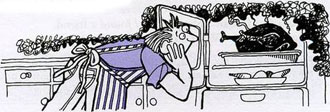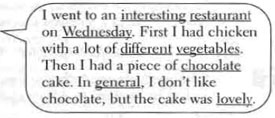Unit 21. Eye, My, Mine.
Introducing Syllables
Unit 21; Part A
| We can divide a word into one or more syllables. For example mum has one syllable, mother has two syllables and grandmother has three syllables. A syllable is a group of one or more sounds. The essential part of a syllable is a vowel sound (V).Some syllables are just one vowel sound. For example, these words haveone syllable, and the syllable is just one vowel sound: eye /ai/, owe/∂υ/. A syllable can have consonant sounds (C) before the V, after the V or before and after the V. Here are some more examples (they are all words of one syllable).
Note: There may be more than one С before or after the V. (See Units 24, 25.) |
Unit 21; Part B
| Remember that letters are not the same as sounds. For example, the consonant letters W and Y are not consonant sounds if they come after the vowel sound in the syllable e.g. saw, say. They are part of the vowel sound. In some accents, for example South East English, the same is true for the consonant letter R. Here are some more examples. They are words of one syllable and they all have the pattern CV. how /haυ/ law /lo:/ pay /peι/ why /waι/ car /ka:/ hair /he∂/ |
Unit 21; Part C
| Some people use the word syllable to talk about the parts of a written word. But here, the word syllable is used to talk about the pronunciation of words, not the writing. For example, in writing we can divide 'chocolate' into three parts like this: cho-co-late. But when we say the word, we pronounce only two syllables, like this: chocolate /t∫ok.l∂t/.(The dot shows where the two syllables are divided.) A number of otherwords may be pronounced with fewer syllables than in writing. Listen tothese examples. chocolate /t∫ok.l∂t/ different /'dιf.r∂nt/ interesting /'ιn.tr∂s.tiη/ general /d3en.r∂l/ comfortable /'кΛmf.t∂.b∂l/ secretary /'sek.r∂.trι/ |
Unit 21; Part D
| The first syllable in these words has the same three sounds, but in the opposite order: kitchen /kιt∫.ιn/ - chicken /'t∫ιk.ιn/. If a sentence has similar-sounding syllables like this in it, it may bedifficult to say. These sentences are called 'tongue-twisters'. Listento this example. Richard checked the chicken in the kitchen.  |
Exercises
| Unit 20 Unit 21 Unit 22 |

